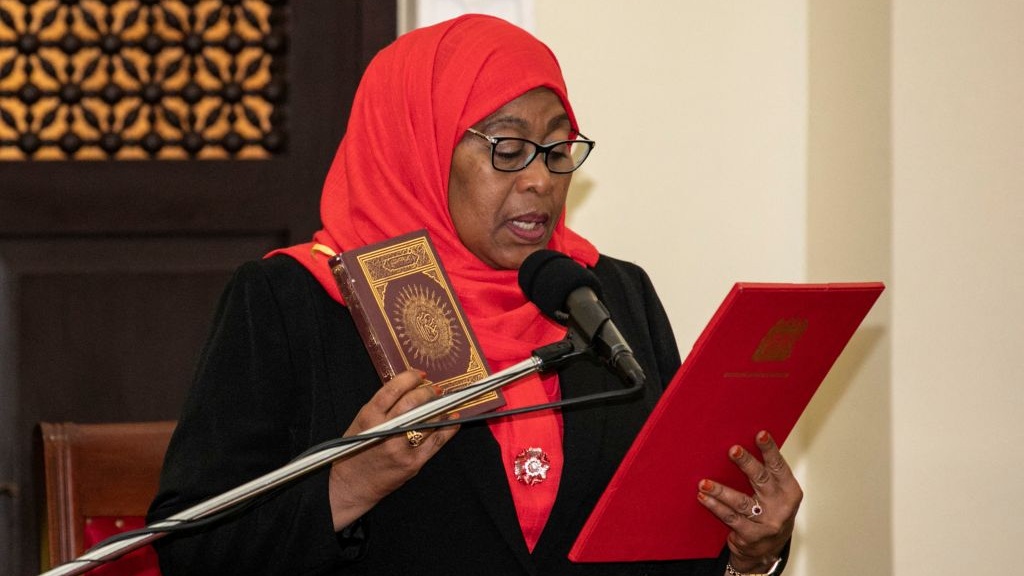This feature is part of Blavity’s African Spotlight series which highlights heads of state, as well as other politicians and societal leaders, who are currently in power or influencing change on the continent. African leaders are making significant impacts both in their own countries and internationally. Growing diasporas and increasing interconnectivity make developments on the continent more relevant to Black America and people everywhere than ever before.
Tanzania's Vice President Samia Suluhu Hassan was sworn in as president of the country Friday after two days after announcing that President John Magufuli had died at age 61.
Suluhu, also 61, has been vice president since 2015 and won re-election alongside Magufuli last year. After having served as Tanzania’s only female vice president, Suluhu now becomes one of a small handful of women who have officially led a modern African state. She is also among only a few Muslim women who have served as heads of state for any country. Suluhu’s ascension also means she now takes over the leading role in the Chama Cha Mapinduzi (CCM) – Swahili for “Party of the Revolution.
Suluhu hails from the island of Zanzibar, a former Islamic sultanate that merged with the mainland region of Tanganyika in 1964 to create Tanzania — Zanzibar remains an autonomous region in the country. After earning undergraduate and master's degrees in Tanzania and the United Kingdom, Suluhu became an activist, working for the UN World Food Programme and later managing an umbrella organization for Zanzibari non-governmental organizations.
Suluhu entered politics in 2000, winning a seat in the Zanzibar House of Representatives and then joining the cabinet of the president of Zanzibar. She followed this with stints in the National Assembly and the cabinet of then-President Jakaya Kikwete. Among her duties in the government was serving as vice-chairperson of a constituent assembly that wrote a new constitution for Tanzania. When Magufuli ran in 2015 to succeed Kikwete, he chose Suluhu as his running mate.
“Mama Samia,” as she is sometimes affectionately called in Tanzania, is well-respected, but not much is known about her political stances or how she will lead the country. However, there are reasons to believe that she will be the breath of fresh air that many Tanzanians are hoping she will be. Magufuli had drawn local and international criticism for suppressing opposition and rigging the most recent election that returned him and Suluhu to power.
Suluhu was a loyal part of President Magufuli's administration, with some people criticizing her for not speaking out more on important issues like the government’s lack of response to COVID-19, but she was not afraid to occasionally break with Magufuli on important issues. One victim of Magufuli’s rule had been opposition presidential candidate Tundu Lissu, who was shot and nearly killed by gunmen in a 2017 assassination attempt. As vice president, Suluhu visited Lissu as he recovered in a hospital in neighboring Kenya – claiming that the visit was on behalf of Magufuli. At the time, Lissu, who now lives in exile after years of government harassment, received the gesture positively.
In another incident, while Magufuli drew condemnation from women’s rights activists for saying that pregnant girls should be kicked out of school, Suluhu publicly objected to denying the girls their education and said that the girls should be allowed to return. Suluhu often served as the public face of Tanzania for the international community, representing the country at meetings of the United Nations and other international organizations while President Magufuli rarely traveled outside of the country.
One important policy area in which Suluhu may depart from her predecessor is in her response to the coronavirus pandemic. Magufuli was widely condemned for refusing to acknowledge the pandemic. The deceased president, who publicly rejected masks and vaccines, is widely rumored to have died from the virus, although this has not been confirmed. During an appearance on Tanzanian television, Suluhu rejected the rumors and claimed that Magufuli had died of heart disease. Despite this public denial, at least one Tanzanian political expert expects Suluhu to shift towards stricter COVID-19 regulations for the country, although politics may dictate that she do so gradually.
More generally, Suluhu will likely have challenges leading the country, as she has faced opposition from factions within the ruling CCM party, including Christian politicians who were opposed to having a Muslim and a Zanzibari ruling the country. Despite whatever pushback she might get, Suluhu will likely have the time to make her own mark on Tanzanian politics. Per the Tanzanian constitution, she will now serve out the remainder of the late president’s term, which expires in 2025, and she will be eligible to run for an additional full term.
Suluhu may even be able to establish her own political dynasty, as her daughter, Mwanu Hafidh Ameir, has already started to walk in her mother’s footsteps and is a member of the Zanzibar House of Representatives. For now, however, Suluhu will have to establish her own authority, something she will likely do in her trademark soft-spoken manner.
“I can speak to you, in a soft tone,” Suluhu told the BBC last year, “but make it clear that you understand what I mean.”
